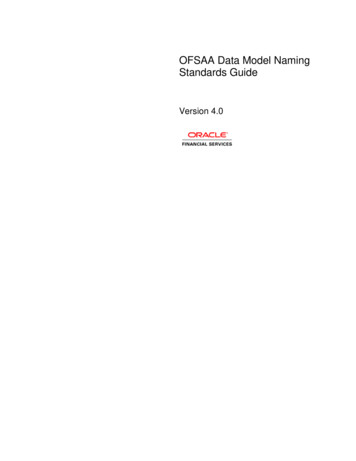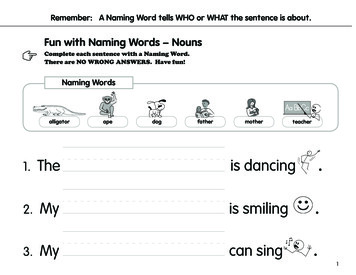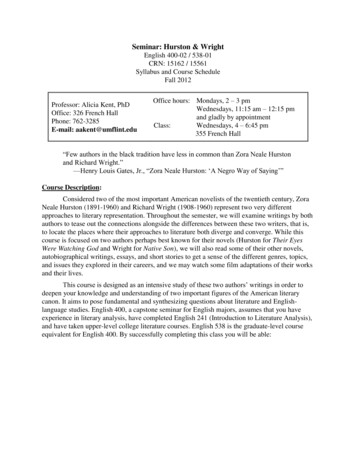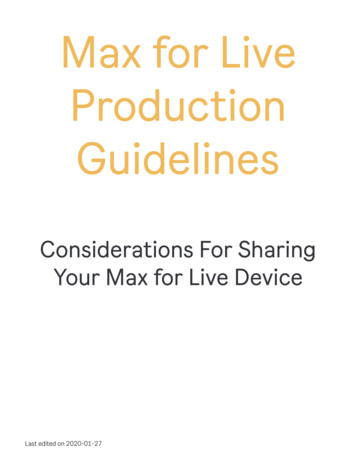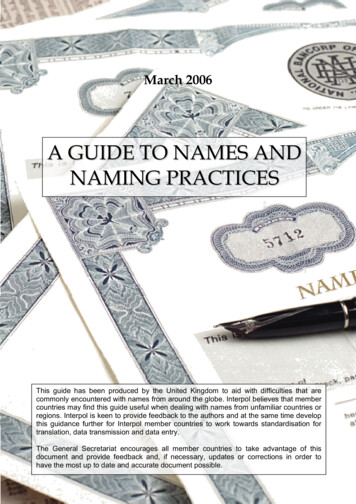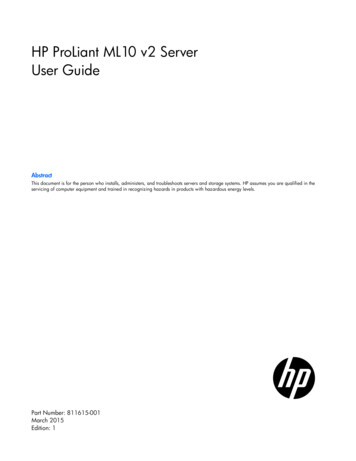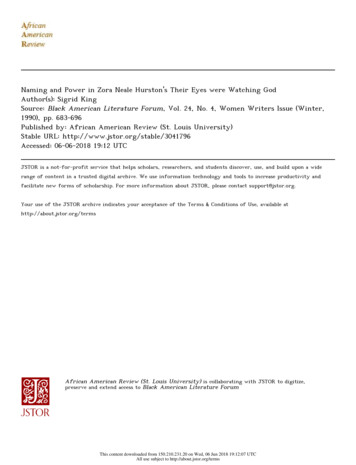
Transcription
Naming and Power in Zora Neale Hurston's Their Eyes were Watching GodAuthor(s): Sigrid KingSource: Black American Literature Forum, Vol. 24, No. 4, Women Writers Issue (Winter,1990), pp. 683-696Published by: African American Review (St. Louis University)Stable URL: http://www.jstor.org/stable/3041796Accessed: 06-06-2018 19:12 UTCJSTOR is a not-for-profit service that helps scholars, researchers, and students discover, use, and build upon a widerange of content in a trusted digital archive. We use information technology and tools to increase productivity andfacilitate new forms of scholarship. For more information about JSTOR, please contact support@jstor.org.Your use of the JSTOR archive indicates your acceptance of the Terms & Conditions of Use, available athttp://about.jstor.org/termsAfrican American Review (St. Louis University) is collaborating with JSTOR to digitize,preserve and extend access to Black American Literature ForumThis content downloaded from 150.210.231.20 on Wed, 06 Jun 2018 19:12:07 UTCAll use subject to http://about.jstor.org/terms
Naming and Power in Zora Neale Hurston'sTheir Eyes Were Watching GodSigrid KingThe women say, unhappy one, men have expelled you from the world ofsymbols and yet they have given you names, they have called you slave, youunhappy slave. Masters, they have exercised their rights as masters.-Monique Wittig, Les GuertlleresNaming has always been an important issue in the Afro-American tradition because of its link to the exercise of power. From theirearliest experiences in America, Afro-Americans have been madeaware that those who name also control, and those who are namedare subjugated. Slaves were forced to abandon their African identi-ties when they were captured, and were renamed with theirmasters' identities when they arrived in America. In Orality ancdLiteracy, Walter Ong points out that for primarily oral cultures(such as the early slave communities) naming conveyed a powerover things, for without learning a vast store of names, one wassimply "powerless to understand" (33). This sense of powerlessnesscould extend beyond the individual to include an entire communityof "unnamed" people. Naming is tied to racial as well as individualidentity: "To have a name is to have a means of locating, extending,and preserving oneself in the human community, so as to be ableto answer the question 'who?' with reference to ancestry, currentstatus, and particular bearing, with reference to the full panoply oftime" (Cooke 171). William Halsey in his essay "SignifI(cant) Correspondences" further emphasizes the importance of naming for Afro-Americans, saying that names and naming are "a heavily ritualizedrite (or is that right?) of passage and theme prevalent in Africanculture" (259).Sigrid King is a graduate student at Louisiana State University currentlywriting a dissertation on Restoration women playwrights.BlackAmerican Lterature Forum, Volume 24, Number 4 (Winter 1990)? 1990 Sigrid KingThis content downloaded from 150.210.231.20 on Wed, 06 Jun 2018 19:12:07 UTCAll use subject to http://about.jstor.org/terms
684SigridKingThis concern with naming in Afro-American culture is evidentin black literature from the earliest slave narratives to morecontemporary works. The titles of many of these works, such asBlack Boy, Invisible Man, and Nobody Knows My Name, indicatetheir authors' awareness of the correspondence between namelessness and lack of power. Ralph Ellison, in "Hidden Name andComplex Fate" stressed that "our names, being the gift of others,must be made our own" (147). Taking possession of one's ownname and thus claiming sovereignty over one's self is an act ofpower. In his article" 'I Yam What I Am': Naming and Unnamingin Afro-American Literature," Kimberly Benston defines languagein a way which is particularly relevant to a discussion of namingand power:Language-that fundamental act of organizing the mind's encounterwith an experienced world-is propelled by a rhythm of naming. It is themeans by which the mind takes possession of the named, at once fixingthe named as irreversibly Other and representing It In crystallized Isolation from all conditions of externality. (3)Benston's use of the phrase take possession shows clearly theunderlying text in the naming of slaves by their masters. Fixingthe named as "Other" also implies an interpretation of thenamed as an object, rather than a subject-something whichcannot be part of the namer's self. The objectification of slaves isa well-documented method used by slave owners to distancethemselves enough from their slaves to treat them as nonhuman. The namer has the power; the named is powerless. Forthe powerless, being named carries with it the threat of limitation, reduction, and destruction.In order to break away from this sense of powerlessness, AfroAmericans have historically "unnamed" or renamed themselves.As Benston points out, renaming can be a means of self-creationand refonnation of a fragmented familial past. Former slavesdiscarded their masters' names and created new names forthemselves. Self-designation indicated social and economic freedom, the birth of a truly new self (3). Benston points out thatunnaming has a particular significance for the questing hero orheroine in much of Western literature. Many questing literarycharacters come to the realization that names are fictions, thatno particular name can satisfy the energy of the questing self. Solong as the questing character seeks a name through a prescribed social role, he or she discovers only limitation, whereas,when a character is unnamed, he or she can have limitlessdesignations which disrupt the function of social labeling andThis content downloaded from 150.210.231.20 on Wed, 06 Jun 2018 19:12:07 UTCAll use subject to http://about.jstor.org/terms
Naming and Power in Their Eyes Were Watching God 685deny the applicability of words' topical function to his or herunfolding experience (7-9).Benston's essay is an important introduction to the relationship between naming and power, but his examples only explorethis issue in the literature of men. Naming has a double import-ance in the tradition of Afro-American women writers. One of thecrucial issues for women writing within the Western tradition isthe dichotomy between woman's command of language as op-posed to language's command of woman (Gilbert and Gubar236). Gilbert and Gubar point out that "the female need toachieve a command over language has, to begin with, been mostpractically expressed through strategies of unnaming and renaming, strategies that directly address the problem of woman'spatronymically defined identity in western culture" (237). Blackwomen have experienced a "double dispossession" (238). Lorraine Bethel discusses the two ways in which black women areoppressed: "The codification of Blackness and femaleness bywhites and males is contained in the terms 'thinking like awoman' and 'acting like a nigger . . .' " (178). To counterbalancethis, black women writers often focus on connection rather thanseparation, transforming silence into speech, and giving backpower to the culturally disenfranchised (Pryse 5).One of the most important and innovative Afro-Americanwomen writing in this tradition is Zora Neale Hurston. Hurston wasa pioneer in the attempt to define the totality of Afro-Americanwomen in literature and anthropological studies, rather thantheir being defined by others (Bush 1035). Hurston's novel TheirEyes Were Watching God focuses on the character Janie, whosequest for the "horizons" of herself finally leads her to a placewhere she defines herself, despite a society which wants to denyher power because she is a black woman. The importance ofnaming and unnaming in Hurston's novel fixes it firmly withinthe tradition of Afro-American women writers. As Janie developsin the novel, she experiences the oppressive power of those whoname her, the growing potential of being renamed, and finallythe freeing experience of being unnamed.Near the start of the novel, Janie has no name when shereturns to Eatonville: "So the beginning of this was a woman" (9).The sentence places her within the larger context of the womenmentioned in the book's second paragraph: "Now, women forgetall those things they don't want to remember, and remembereverything they don't want to forget" (9). As Janie walks intotown she remains nameless; in fact, it is not until several pagesinto the novel that she is finally named by the townspeople onThis content downloaded from 150.210.231.20 on Wed, 06 Jun 2018 19:12:07 UTCAll use subject to http://about.jstor.org/terms
686SigridKingthe porch. Ironically, when they say her name, they do so incorrectly; since she had married for a third time, her name is nolonger" 'Janie Starks'" (12). Naming is clearly a source of powerfor the watchers on the porch, yet their power cannot affectJanie. Because the townspeople have been under the"bossman's" eye all day, they now need to exercise some power inthe only way they can-within their oral tradition. -They becamelords of sounds and lesser things. They passed nations throughtheir mouths. They sat in judgment" (10). The metaphors used todescribe their words equate them with weapons. Janie recognizes the negative relationship between her neighbors' sense ofpower and naming. Speaking to Pheoby later, she calls themcollectively " 'Mouth-Almighty' " (16), and Pheoby comments that"so long as they get a name to gnaw on they don't care whose itis, and what about, 'specially if they can make it sound like evil"(17).According to Hortense Spillers, it is important that Hurstonchose to name her character Janie because it differentiates herfrom a literary type (such as the women found in literature byLarsen and Fauset) whose life possibilities have been circumscribed and prescribed by preconditions (253). Janie's namegives her an identifiable status, yet it does not limit her to onerole or life experience.As Janie and Pheoby talk, Janie begins to trace the experiences that have brought her back to Eatonville. Starting with heryears as a little girl, Janie makes it clear that naming was usedas a limiting or prescribing force by people around her and that,at a young age, she adopted their views of naming as her own.Janie relates how she was raised by her grandmother, Nanny, inthe home of a wealthy white family, the Washburns. Because ofher protected environment, Janie did not know she was blackuntil she was six years old. As she explains the event in whichshe discovered her racial heritage, Janie mentions that the whitefamily named her "Alphabet": "'Dey all useter call me Alphabet'cause so many people had done named me different names'(21). As "Alphabet," Janie seems to be no more than a character(like a letter of the alphabet) who signifies nothing for herselfwhile facilitating the "circulation of signs" that reinforces communication among those who exercise power (Gilbert and Gubar238).Elizabeth Meese feels that Janie, at the beginning of her life,"receives her sense of definition from others. She is woman asobject in a racist, patriarchal culture. Failing to recognize herselfas the one black child in a photograph, she begins her storyThis content downloaded from 150.210.231.20 on Wed, 06 Jun 2018 19:12:07 UTCAll use subject to http://about.jstor.org/terms
Naming and Power in Their Eyes Were Watching God 687without name or color" (61-62). It is interesting that Hurstonbegins both the narrative frame and Janie's narrative with Janieas a nameless character. The effect is one more of contrast thanof resonance, though, since Janie as an adult is well-defined anddoes not need to be named to identify herself, as she did as agirl.Janie's first lessons about naming come from a woman whosename, Nanny, exemplifies her place within the white patriarchalstructure. One of Nanny's responsibilities was to look after the fourwhite grandchildren who lived in the Washburn house. Janie says,"'Dat's how come Ah never called mah Grandma nothin' butNanny, 'cause dat's what everybody on de place called her' " (20).Nanny lived under the naming system of the white slave ownerswho used force to teach her the connection between names andpower. Nanny relates an incident to Janie in which the mistress ofthe plantation where she was enslaved confronted her in the slavecabins. The mistress, angry over Nanny's illegitimate child, tellsher, "'" Look lak you don't know who is Mistis on dis plantation,Madam. But Ah aims to show you" ' " (33). The white woman invokes her own name, Mistress, and ties it to the brutal power of thewhip which she will use to "show" Nanny.Nanny teaches Janie the same lessons she learned about naming: Names are bound within the white male power structure,and the most s black woman can hope for is to endure withinthem. Nanny's explanation of the power hierarchy places blackwomen on the bottom as " 'de mule[s] uh de world' " (29).Nanny's naming of all black women, including Janie, as "mules"will haunt Janie for the next twenty years. She will be identifiedwith the work animal first by Logan Killicks and then by JoeStarks when he buys a mule many years later in Eatonville.Janie will not be free of the mule name until Joe's mule finallydies.In her adolescence, Janie tries her own hand at naming. Asshe is stretched on her back beneath the pear tree in Nanny'sback yard one afternoon, she has an intense sensory experienceof delight and responds by naming it "marriage" (24). By misinterpreting her own deepening sense of her self as a sign of possi-ble joy with another, Janie limits the thing she names. MissyDehn Kubitschek states that this identification of marriage withtotal fulfillment reflects Janie's immature consciousness, andthat her interpretation of the tree is essentially static, focused ona prescribed social institution (22).Because Janie associates marriage with her experience underthe pear tree, she allows Nanny to arrange for her first legalThis content downloaded from 150.210.231.20 on Wed, 06 Jun 2018 19:12:07 UTCAll use subject to http://about.jstor.org/terms
688SigridKingname change to Mrs. Logan Killicks. Killicks's name is ironic, forhis relationship to Janie quickly "kills" her definition of marriage: "She knew now that marriage did not make love. Janie'sfirst dream was dead, so she became a woman" (44). With Kil-licks, Janie also learns more about the power associated withnames. When they argue about her doing outside work in theiryard, she calls him " 'Mist' Killicks,' " a name which ironicallyreflects his attempt to be her master. He, on the other hand,calls her " 'LilBit,' " a name which reveals her position of powerlessness in his mind. Logan Killicks finally goes too far when heassociates Janie with a second mule for working in the fields.Janie knows from Nanny's narrative that the mule has the leastpowerful position, and she knows that is not what she wants.Janie finds her way out when Joe Starks appears. The firstthing Joe does after asking for a drink of water is to namehimself: "Joe Starks was the name, yeah Joe Starks from in andthrough Georgy" (47). Hurston's naming of Starks is ironic forseveral reasons. The word stark is often used as a synonym forbarren, and Joe Starks and Janie never have any children.Hurston hints at sexual problems that develop between the pairbecause of their separate beds and Janie's eventual verbal "castration" of Joe in the store. Starks's name is also ironic becauseof his focus on capitalistic pursuits. Starks's wealth gives him afalse sense of power because the townspeople resent him and thethings he does to gain his wealth. Starks's name could also beseen as a comment on his desire to be a "big voice." As Janieeventually finds out, there is not much behind the big voice; it isa facade for the starkness inside Joe.Hurston provides some hints about Joe's true nature throughthe limiting and subjugating names he calls Janie when theyfirst meet. He calls her " 'ill girl-chile' " and " 'pretty doll-baby' "(48-49), indications of the role that he will want her to play oncehe becomes mayor of Eatonville. When Jody names her in thesocially prescribed role of "wife," he says, " 'Ah wants to make awife outa you' " (50). He clearly places himself in the position ofpower by his naming Janie. When Janie tries to name him,substituting the more affectionate "Jody" for "Joe," he is pleased,but still controls the naming. He asks her to " 'Call me Jody lakyou do sometime,' " and after she starts a sentence with his newname, he cuts her off with " 'Leave de s'posin' and everythingelse to me' " (50). Janie is satisfied to stop " 's'posin' " for thetime being. As she rides away with Joe Starks, she realizes that"her old thoughts were going to come in handy now, but newwords would have to be made and said to fit them" (54).This content downloaded from 150.210.231.20 on Wed, 06 Jun 2018 19:12:07 UTCAll use subject to http://about.jstor.org/terms
Naming and Power in Their Eyes Were Watching God 689Although Joe seems better than Logan at first, once he and Janieare together, he quickly assumes the "master" role. Janie uncon-sciously associates him with the white patriarchal system from thebeginning. When she first sees him coming down the road, shenotes that "he was a seal-brown color but he acted like Mr. Washburn or somebody like that to Janie" (47). When Joe and Janie areon the train the day after their marriage, she proudly describes himas "kind of portly like rich white folks" (56). When they arrive inEatonville, Joe begins to use a habitual expression "I god," whichironically sounds as though he is naming himself God. Joe's association of naming with power is apparent when he finds out thatEatonville has no mayor: " 'Ain't got no Mayor! Well, who tells y'allwhat to do?' " (57). The name mayor connotes control over others toJoe. Hurston's synthesis of the name mayor with the phrase I godmay have come from her own life, since her father was a ministerand mayor of the all-black Eatonville when she was born (Bloom,"Chronology" 115).Once Joe finds out there is no named authority, he sets himself up in the town's highest position of power. He gathers themen around him and asks, "'Whut is de real name of deplace?' " (59). Ironically, Eatonville is named for Captain Eaton, awhite landowner who has exercised power over the small, blackcommunity. Joe replaces Captain Eaton as the power brokerwhen he uses his capital literally to "buy" Eatonville for his own.Once he has bought the town, Joe sets himself up as God; hecreates new buildings and names them and brings light toEatonville in the form of the lamp post.Once Joe is officially named mayor, Janie becomes "Mrs. MayorStarks." Unfortunately, the power that Joe readily adopts with hisnew name is not meant to be shared with Janie. Her name simplybecomes a reflection of the new power of Joe. When the townspeo-ple ask "Mrs. Mayor Starks" to make a speech, Joe cuts in:" Thank yuh fuh yo' compliments, but mah wife don't know nothin''bout no speech-makin'. Ah never married her for nothin' lak dat.She's uh woman and her place is in de home'" (69). John Callahanpoints out that Joe views Jarile as his "appendage" (102). Joe says," 'Ah told you in de very first beginnin' dat Ah aimed tuh be uh bigvoice. You oughta be glad, 'cause dat makes uh big woman outayou' " (74). Joe reasons that because he loves being Mr. Mayor,Janie should gratefully accept the name and identity of Mrs. Mayor(Callahan 102). Joe does not understand that Janie can make a" 'big woman outa' " herself. This relationship of power with Joe"t[alk[esJ the bloom off of things" (70) for Janie, and "a feelingcoldness and fear" takes hold of her (74).This content downloaded from 150.210.231.20 on Wed, 06 Jun 2018 19:12:07 UTCAll use subject to http://about.jstor.org/terms
690SigridKingJanie's fears are well-founded, for the role of the mule returnsto haunt her in her second marriage. When Joe first met Janie,he protested against Logan Killicks's treatment of her as a beastof burden: " You behind a plow! You ain't got no mo' businesswid uh plow than uh hog is got wid uh holiday!'" (49). After Joe'sstore and house are completed, though, he comes increasingly totreat her like an animal obliged to work his property. One day asshe is working in the store, she sees some of the men tormentingMatt Bonner's mule outside. Her thoughts reveal an unconsciousidentification of her situation with that of the mule:She snatched her head away from the spectacle and began mutteringto herself. "They oughta be shamed uh theyselvesl Teasin' dat poorbrute lak they is! Done been worked tuh death; done had his dispositionruint wid mistreatment, and now they got tuh finish devilin' 'im tuhdeath. Wisht Ah had mah way wid 'em all." (89)Janie feels as powerless as Matt's mule; she's being mistreatedand "worked to death" by Joe. As she turns away from thewindow, "a little war of defense for helpless things" goes oninside her, and she thinks, "People ought to have some regardfor helpless things" (90). When Joe overhears what Janie hasmuttered, he buys the mule from Matt, pretending that "freeing"the mule is his idea. In front of the others, Janie delivers anironic speech in which she compares Joe to George Washingtonand Abraham Lincoln:'Abraham Lincoln, he had de whole United States tuh rule so he freedde Negroes. You got uh town so you freed uh mule. You have tuh havepower tuh free things and dat makes you lak uh king uh something."(92)Janie's juxtaposition of the freeing of slaves with the freeing ofthe mule shows the ironic contrast between the importance ofwhat Joe has done and what Lincoln did. It also links servitudeto the state of the mule; thus, Janie's servitude to Joe is clearlyless important to him than the "servitude" of the mule.After this incident, Janie begins to feel a stronger desire forfreedom and a greater dissatisfaction with her relationship withJoe. One night, Joe hits her because her dinner does not pleasehim. After that, Janie's image of Joe "tumble[sJ down andshattered," and her association of him with the pear tree ideals isruined (112). He becomes " 'nothin' . . . in [hern mouth' " (118),and she starts to use words to fight back at him. Janie finallydefeats Joe with her words, during their fight in the store, andthe "big voice" of Joe is silenced. When Joe hears Janie exposethe truth about his sexuality, he feels humiliation and rage: "JoeStarks didn't know the words for all this, but he knew the feel-ing. So he struck Janie with all his might" (124). When thisThis content downloaded from 150.210.231.20 on Wed, 06 Jun 2018 19:12:07 UTCAll use subject to http://about.jstor.org/terms
Naming and Power in Their Eyes Were Watching God 691happens, Janie's power relationship with Joe is reversed. ForJanie, "new thoughts had to be thought and new words said"(125). Joe becomes ill and retreats from contact with Janie. Hislast attempt to control her is to name her as his murderer. WhenJanie finds out he is spreading this rumor, she tearfully tellsPheoby, " Tuh think Ah been wid Jody twenty yeahs and Ah justnow got tuh bear de name uh poisonin' him' " (127). Joe's finalactions toward her make Janie sad, but she refuses to be controlled by him.When she realizes that Joe is about to die, she ignores hisorder for her to stay out of the sick room and confronts him onelast time. When she faces her oppressor, she reverses the seat ofpower; Janie becomes the one who names. Janie sees that "Jody,no Joe, gave her a ferocious look. A look with all the unthinkablecoldness of outer space. She must talk to a man who was tenimmensities away" (130). Janie recognizes the difference betweenthe man she affectionately named "Jody" twenty years ago andthe man named "Joe Starks," the "big voice." Janie tells him," 'Listen, Jody, you ain't de Jody ah run off down de road wid.You'se whut's left after he died'" (133). Starks protests againstthe truth, but then Death, "the square-toed one," takes him.Janie muses for a while on the transformation of her Jody intoJoe Starks, "the making of a voice out of a man" (134), and thenshe calls in the community to mourn.Janie takes on a new name at this stage in her life; she becomes the "widow of Joe Starks," a woman of property. It isreadily apparent that the attraction associated with her newname is still linked to Joe Starks. She sees the difference between her state as a "widow" and the status of the other widowsin town; men will woo her because she has Joe Starks's moneyand property. John Callahan feels that with his "big voice" JoeStarks, in effect, became Nanny's successor, and so it is appropriate that after his death and burial Janie discovers her truefeelings about Nanny (105). Nanny's dream for Janie has beenrealized in the security offered by Joe's wealth, but for Janie,Nanny's definition of happiness is not enough:. Nanny had taken the biggest thing God ever made, the horizon-forno matter how far a person can go the horizon is still way beyondyou -and pinched it in to such a little bit of a thing that she could tie itabout her granddaughter's neck tight enough to choke her. She hatedthe old woman who had twisted her so in the name of love. (138)What Nanny had named "love" Janie renames as "mis-love"(138). Janie recognizes that she must define her own horizonsnow. Maria Tai Wolff states that Janie knows that another'sThis content downloaded from 150.210.231.20 on Wed, 06 Jun 2018 19:12:07 UTCAll use subject to http://about.jstor.org/terms
692SigridKingideas are never adequate; the only truths she will now accept arethose derived from her own experience (31).As soon as Janie has this realization, she imagines her owncreation. Missy Dehn Kubitschek says that Hurston underscoresJanie's rebirth by associating her reflections on her marriageswith a creation myth (24). Janie finds a "jewel" within herselfand opposes that image to "tumbling mud-balls" (139). Janie hasa new sense of strength and identity which comes from withinherself rather than from her association with someone else.Tea Cake's entrance into Janie's life and his relationship tonaming foreshadow the kind of relationship they will share.Whereas Joe Starks's first words were to name himself ("JoeStarks was the name"), Tea Cake's first words call Janie byname, "'Good evenin', Mis' Starks,'" (144). Janie tells him thathe has" 'all de advantage 'cause Ah don't know yo' name'" (144),but Tea Cake does not view his name as important. " 'Peoplewouldn't know me lak dey would you,'" he tells her (145). Janiefinds herself relaxed and laughing as she talks to Tea Cakebecause he uses his words to entertain her. John Callahan saysthat Tea Cake "revivifies" names (106): Instead of asking Janiefor a match, he says, " 'You got a lil piece uh fire over dere,lady?'" (145). When Janie finally learns his name, she finds thathe has been renamed from Vergible Woods to Tea Cake. Janielikes the renaming and asks Tea Cake if it suits his nature:" Tea Cake! So you sweet as all dat?' " (149). Tea Cake does notname to gain power; he names to explore the true nature of athing.As their relationship develops, Janie finds that naming nolonger holds the limiting power that it manifested in her relationships with Logan and Joe. She explains to Pheoby that the agedifference between her and Tea Cake does not affect them be-cause they " 'thinks de same' " (173). Janie forms a new relationship to language, but this time she has power over it rather thanits having power over her: " 'So in the beginnin' new thoughtshad tuh be thought and new words said. After Ah got used tuhdat, we gits 'long jus' fine. He done taught me de maiden lan-guage all over'" (173). Tea Cake's use of language is positive andcreative, rather than limiting and destructive.Soon after this, Janie and Tea Cake are manied. This time, hername change does not bring about a relationship of unequal power.Instead, she and Tea Cake move away from Eatonville and form anew life in the " 'Glades." Their trust and love for each other develop so far that Janie can finally feel free to say to Tea Cake, " 'Allright then, you name somethin' and we'll do it'" (250). SheThis content downloaded from 150.210.231.20 on Wed, 06 Jun 2018 19:12:07 UTCAll use subject to http://about.jstor.org/terms
Naming and Power in Their Eyes Were Watching God 693knows that, because she and Tea Cake think "the same," he willnever use his naming as a source of power over her.Although their move away from Eatonville provides them witha place where they can create their own relationship to language,it also places them in a larger world, a world which is not raciallysegregated and which brings them face to face with the forcesthey name "God" and "Death." The issues of race and name are,however, inextricably combined by Mrs. Turner, Janie and TeaCake's neighbor in the " 'Glades." Mrs. Turner's use of namingfalls into the Western literary tradition described by Benston.The privileging of "white" over "black" and the reduction of ahuman being to the word nigger are methods used by Mrs.Turner to give her a sense of power. She tells Janie:"Ah can't stand black niggers. Ah don't blame de white folks from hatin''em 'cause Ah can't stand 'em mahself. 'Nother thing, Ah hates tuh seefolks lak me and you mixed up wid 'em. If it wuzn't for so manyblack folks it wouldn't be no race problem. De white folks would take usin wid dem. De black ones is holdin' us back." (210)Mrs. Turner names people by their skin color rather than theirindividual names. Her rejection of "black niggers" is a completedenial of her Afro-American heritage.Mrs. Turner is not Janie's only exposure to the destructivenaming based on skin color. After the hurricane, when Tea Cakeand Janie are recovering in Palm Beach, Tea Cake is approachedby two white men with guns. He is concerned because they donot know him, but he soon discovers that they are not interestedin his real name:"
Their Eyes Were Watching God Sigrid King The women say, unhappy one, men have expelled you from the world of symbols and yet they have given you names, they have called you slave, you unhappy slave. Masters, they have exercised their rights as masters.-Monique Wittig, Les Guertlleres Nam

